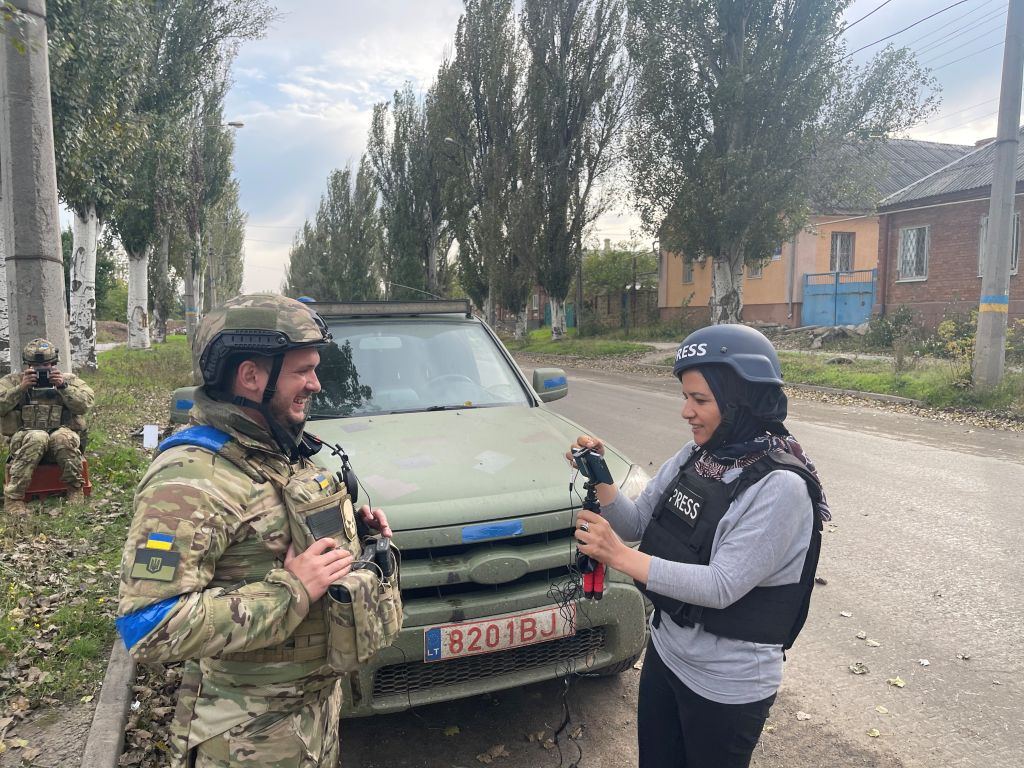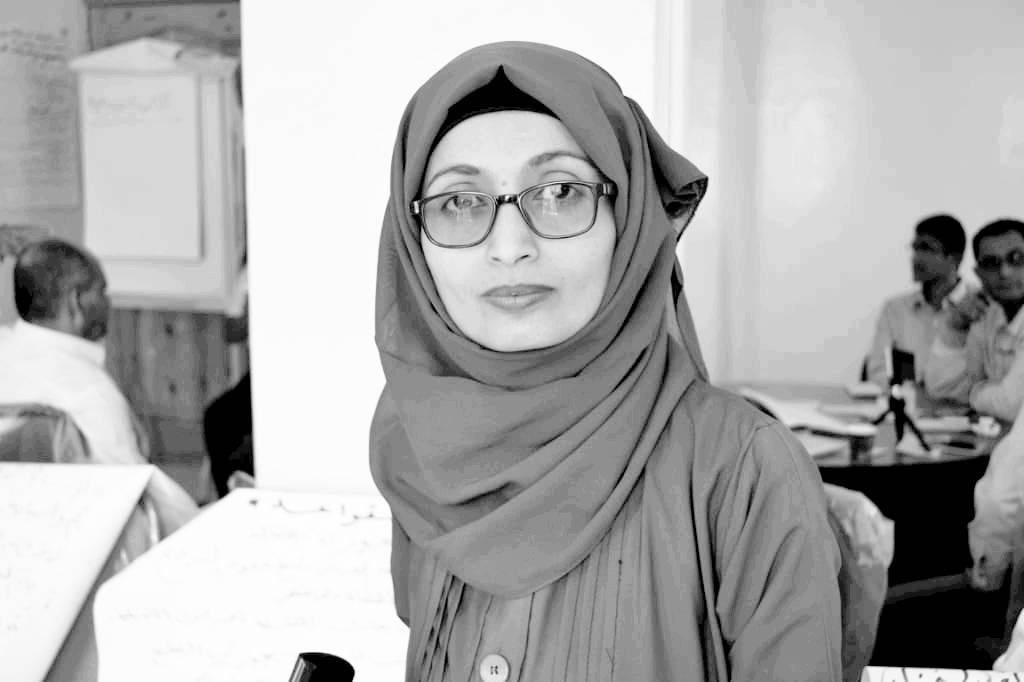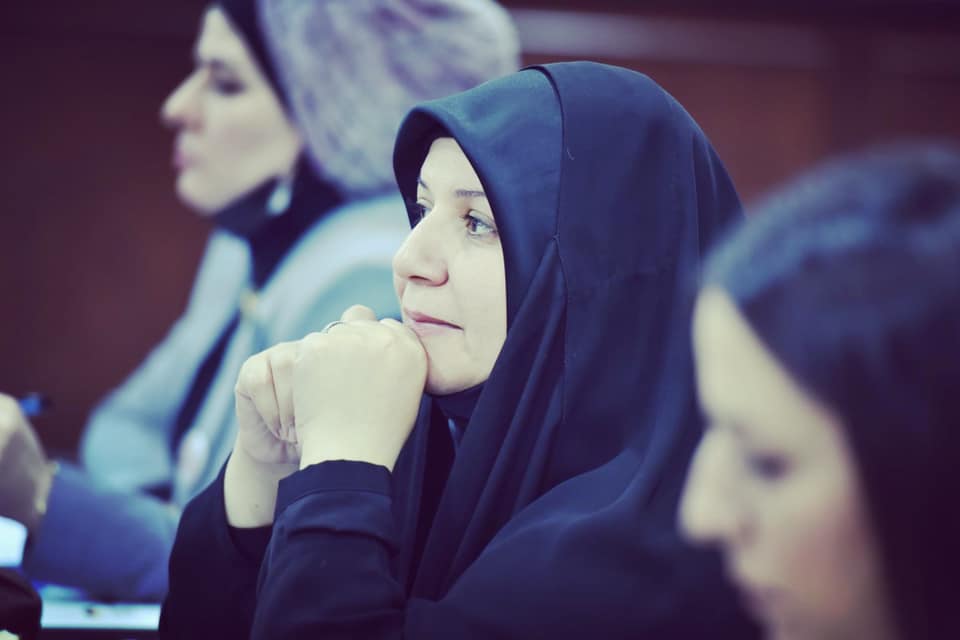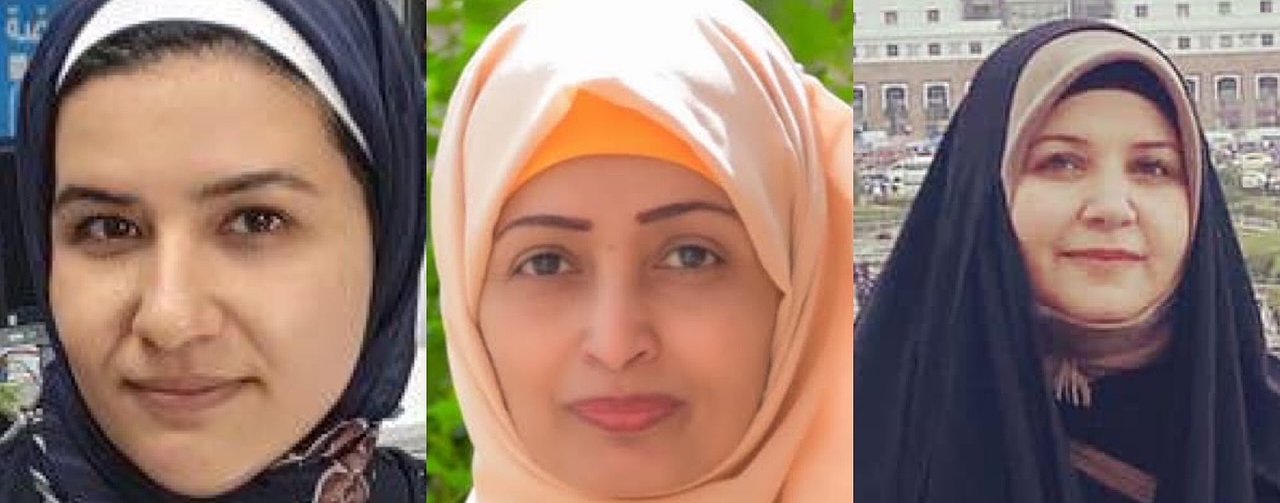As the year 2022 draws to a close, three members of The Marie Colvin Journalists’ Network share their stories of war, courage and hope.
Safaa Saleh (Egyptian based in Dubai)
Safaa is a senior war correspondent for the Dubai-based Alaan TV network. She has covered major conflicts, from the wars in Syria and Libya, to the Taliban’s takeover of Afghanistan in 2021. She spent almost a month in Ukraine this year. She reported from all the major frontlines, and experienced a fear she never knew existed.
I was late to arrive in Ukraine because I had issues with my visa, but also because we didn’t realise the war would last this long. I went to all the major battlefields: from Kharkiv, to the Donbas region, Kherson, Odessa, Mykolaiv and others.
As a war correspondent and safety expert, I’m experienced in taking cover from fire when it comes from conventional weapons and tanks. But the attacks that took place in Ukraine were from drones and guided missiles. So going into any battle ground was extremely difficult.
The most difficult thing was to find a place to hide. All the frontlines were open spaces, and sometimes the two sides were only separated by a river. Cities were completely destroyed, and there was no place to hide.
I work alone. I shoot my own material, do the interviews, write the scripts, and then send everything to the newsroom in Dubai. The last time I worked with a crew was in Libya in 2014 when I was working with Al Masry Al Youm. My cameraman, Tareq Wagih, was kidnapped on that assignment and I had to complete the work on my own. Although he was released, when I returned to Cairo the management decided to train me to shoot videos so I could work alone. Ever since, I haven’t worked with anybody aside from translators and fixers.
October 7th was one of the most difficult nights in Ukraine. I arrived at the hotel in Kharkiv at 11 pm, after a long day of work in the neighbouring city of Izium. I went to sleep, and half an hour later, I woke up to the sound of four bombs. It was so loud we thought our hotel was being targeted. I called my translator in the next room and he said we must head downstairs to the shelter. What shocked me the most was that he told me, very calmly, to bring my passport so they could identify my body if something happened to me.
I feel like I’m taking part in writing history so it won’t be forged.
I didn’t go down to the shelter. I got dressed and sat on a chair behind the chair in pitch darkness, and I read the Quran.
It was the first time I felt that this could be the last night of my life. I also wrote a post on Facebook bidding my friends farewell, but then I remembered that my siblings and their children could read it and I didn’t want them to worry.
The next morning, we discovered that the target of the air raids was only 500 metres away from our hotel.

In my work, I focus on human stories and the consequences of war crimes on ordinary people. One of the most difficult interviews I did was with a man who survived the Russian attack on the town of Bucha. He was trying to flee the city with his family in his car, but gunmen killed his wife and children. He was crying during the interview as he recounted what happened. Then suddenly, he bent down, took off his shoes, then took out his leg to show me that it was amputated. It was really shocking because he didn’t tell me beforehand that he was about to do that.
I don’t know what draws me to conflict zones, but sometimes I feel like I’m taking part in writing history so it won’t be forged. So many things in history were either twisted or covered up. There are many who question the tragedy of Yazidi women in Syria, and deny the fact that they were being sold as slaves in the market. But I went there in 2015, I met those women and I met the young men who tried to save them and smuggle them from Raqqa and Tal Afar in Syria back to their families in Iraq. I fell into a depression when I returned from that assignment and I blamed myself for making those women recount the horrifying details of what happened to them.
When my reports were published, I was attacked by hardliners and some tried to hack into my accounts and question my reports. Even today, some criticise me for going to Ukraine and say I should work on Iraq and Syria instead of covering a war in a European country. But I cover all wars and what many people don’t realise is that many Arabs live in Ukraine, especially in Kyiv and Odessa. They live in peace and do not experience discrimination.
Naim Khaled (Yemen - Taiz)
Naim is a reporter for the official Aden TV station, and contributes video material to other Arab news agencies. She also runs her own website, Naim News, where she publishes news stories and opinion columns. A mother of two boys and a girl, she’s been reporting from the frontlines of the besieged city of Taiz since the beginning of the war in Yemen. 2022 was the first year that she focussed on social and human stories instead of reports on death and destruction, but it was also the year she suffered an unprecedented harassment from religious hardliners.
I just got back from covering the first book exhibition at the University of Taiz since the beginning of the war. his shows that people are eager to return to peace and stability. They haven’t forgotten the war, but they choose to ignore it and dream that culture could return to our besieged city.
After years of reporting from the frontlines in my country, this has been the first year where I focussed on human and social stories. Travelling to other cities is extremely difficult, but this year I managed to go to refugee camps and I wrote about displaced communities and their educational and health needs. I also covered social issues such as violence against women in rural areas.
I cannot leave my profession because of fanatics. They are intruders and our society will reject them in the end.
There were hopeful signs this year. The UN’s special envoy to Yemen, Hans Grundberg, visited Taiz for the first time and spoke with all the political parties without exceptions. Also, during Eid Al Adha, concerts took place over five days in Martyrs Square, although it was bombed several times. Musical bands came all the way from Hadhramaut and Sana’a. We defied the curfew and danced and sang together, men and women, until midnight.
But the war isn’t over. Taiz is still besieged by the Houthis, and there is only one exit route to the west. The neighbouring town of Houban should be four minutes away by car, but getting there takes six hours. The roads are dangerous and many have died in accidents as they were trying to get home to their families.
There were some tragedies this year. In July, eleven children were killed in a missile strike. I also remember there were two little sisters who went out to fetch firewood and stepped on a landmine. They were meant to come home with firewood but instead came back without limbs.

This year, I was also harassed by hardliners who don’t respect working women, and in an unprecedented way. Whenever I go to a mosque to cover the funeral of a martyr, men would attack me claiming that it’s forbidden for women to enter a mosque. But there is no verse in the Quran that says that. Once, I went to a refugee camp, but the manager wouldn’t let me in on the pretext that I don’t have a permit, despite the fact that I was carrying a press card. He was very insulting because I’m a woman. And there are many campaigns being run by hardliners against civil society and the media. They claim that we are promoting promiscuity and they attack women journalists who don’t wear the face covering (niqab) because they consider such women as “deviants”. This bullying has been really exhausting for me, and I often sit alone at night and cry.
I cannot deny that I have considered stopping work because of those men who use religion against us. There is unprecedented fanaticism, and Taiz wasn’t like that in the past. I’ve been a journalist since 2003, and I used to report from the field without trouble but things have changed. Having said that, I cannot leave my profession because of those fanatics. They are intruders into our community and I believe that our society will reject them in the end.
Manar Zubeidi (Iraq - Al-Diwaniyah)
Manar is the editor of both Al Manar News website and Ana Hurra podcast, producing critical stories on women’s issues and gender-based violence in Iraq. She is also active with many civil society organisations that offer legal and safety advice for women. A mother of two boys and two girls, she hails from the city of Al Diwaniyah, to the south of the capital, Baghdad. As an independent journalist who’s vocal on political issues, women’s rights and ethnic minorities, Manar has endured the wrath of political and religious parties for many years.
This year, I wrote about many issues that are often ignored. Every time I wrote about women, some accused me of either inciting women to break traditions, or going against religion.
I talked about incestual rape, which some mistakenly identify as “adultery”. Adultery is what happens between consenting adults, but incest is women getting raped by their male relatives. Some accused me of tarnishing our society’s image and harming familial ties. I also did a podcast on divorce and said it was a woman’s right to free herself from a violent marriage. Some said I was promoting divorce, and I do maintain that divorce is allowed in Islam in the same way that polygamy is allowed.
I will continue to write and document violations because this is my moral responsibility towards my society.
This year, I also gave lectures in several universities on blackmail against women. Many of them are often threatened with personal photos or messages being published that could harm their reputations and create problems for them with their families. I advised women who are being blackmailed to break their silence and reach out, either to the community police or me directly so I can offer them help. Some of the attendees accused me of trying to break up families and expose women and ruin their reputations. But the majority of the audience were understanding and contacted me directly to offer their help.
I also conducted sessions for Internews on gender-based violence in several governorates, some of which are considered religious and tribal. During those sessions, I discovered that sexual harassment was the most rampant form of violence. Again, some attendees protested and denied that any such thing could happen in their religious and conservative towns. But many of the women who were there confirmed that harassment was widespread, and that some of the perpetrators were influential figures, and that no one dares to confront them out of fear.

When I write about violations in my city, Al-Diwaniyah, which is the capital of Al Qadisiyah governorate, I am criticised because I hail from a conservative region and so I’m not allowed to talk about it in this way. For instance, if I talk about the abuse of gypsies as an ethnic minority, officials make fun of me and ask me why I’m interested in them since I’m not a gypsy.We, independent women journalists, are always targeted because we don’t work with media that are affiliated with political parties, and so there is no one to support us.
This harassment is not new to me. In previous years, there had been attempts to hack into my social media accounts, and direct threats towards me and my family from people affiliated with political parties. On some occasions, I had to delete some of my posts because I was afraid for my own life and my family’s. This year, many journalists had to leave Iraq because they received direct and frightening threats. But it is hard for me to consider leaving my country. My roots are here.
I think our work will become harder next year. The law isn’t being applied properly, perpetrators of violence are getting away with their crimes, and so the working environment isn’t healthy or safe. We will do whatever we can and use any tools that enable us to work freely while protecting our lives and the lives of our families. I will continue to write and document violations because this is my moral responsibility towards my society.
